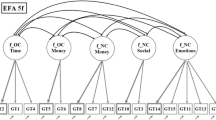Abstract
The Electronic Gaming Motives Questionnaire (EGMQ) assesses motives for engaging in video gaming, which are important to understanding risk for problem gaming and related harms. Only limited research has validated the EGMQ and examined its applicability across demographic subgroups (i.e., invariance). To this end, the present study evaluated the psychometric properties, including measurement invariance, of the EGMQ. Participants (N = 332) were Canadian adults reporting past-year gaming, recruited from an online crowdsourcing platform. Participants completed measures assessing demographic characteristics, gaming behaviours (motives, time spent, games played, problems), and psychological risk factors for problem gaming (e.g., boredom proneness, impulsivity). Confirmatory factor analysis supported a four-factor structure of the EGMQ, including coping, enhancement, social, and self-gratification motive factors. The EGMQ demonstrated configural, metric, and scalar invariance by age, sex, and employment status. Factors were differentially associated with several psychological risk factors for problem gaming, supporting convergent validity of the EGMQ. Concurrent validity was also supported by differential associations of the factors with various gaming-related outcomes, with coping motives associated with the greatest gaming engagement and problem gaming severity. Findings suggest that the EGMQ has good psychometric properties and can be administered to participants from different demographic groups. The EGMQ may be used in future research to understand how coping, enhancement, social, and self-gratification motives for gaming may differentially confer risk for problem gaming and related harms.
Similar content being viewed by others
Data Availability
Data, materials, and code will be made available upon request to the corresponding author and with approval from the York University Research Ethics Board.
Notes
Race/ethnicity was categorized as White and non-White due to most participants identifying as White and thus low sample sizes in non-White subgroups.
References
Asparouhov, T., & Muthén, B. (2018, May 2). SRMR in Mplus. Mplus Web Notes.
Baptist Mohseni, N., Morris, V., Vedelago, L., Kempe, T., Rapinda, K., Mesmer, E., & Keough, M. T. (2022). A longitudinal approach to understanding risk factors for problem alcohol use during the COVID-19 pandemic. Alcoholism: Clinical and Experimental Research, 46(3), 434–446. https://doi.org/10.1111/acer.14774.
Bilgihan, A., Cobanoglu, C., Nusair, K., Okumus, F., & Bujisic, M. (2013). A quantitative study exploring the difference between gaming genre preferences. The Computer Games Journal, 2, 19–40. https://doi.org/10.1007/BF03392334.
Biolcati, R., Passini, S., & Pupi, V. (2021). The role of video gaming motives in the relationship between personality risk traits and internet gaming disorder. Journal of Gambling Issues, 46, https://doi.org/10.4309/jgi.2021.46.12.
Bowen, N. K., & Masa, R. D. (2015). Conducting measurement invariance tests with ordinal data: A guide for social work researchers. Journal of the Society for Social Work and Research, 6(2), 229–249. https://doi.org/10.1207/s15328007sem1302_2.
Brown, T. (2006). Confirmatory factor analysis for applied research. Guilford Press.
Clement, J. (2022). Gaming penetration in Canada 2022. Statista. https://www.statista.com/statistics/274902/gaming-penetration-in-canada/.
Cooper, M. L. (1994). Motivations for alcohol use among adolescents: Development and validation of a four-factor-model. Psychological Assessment, 6, 117–128. https://doi.org/10.1037/1040-3590.6.2.117.
Cooper, M. L., Russell, M., Skinner, J. B., & Windle, M. (1992). Development and validation of a three-dimensional measure of drinking motives. Psychological Assessment, 4, 123–132. https://doi.org/10.1037/1040-3590.4.2.123.
Dahl, D., & Bergmark, K. H. (2020). Problematic internet use: A scoping review - longitudinal research on a contemporary social problem, 2006–2017. Nordisk alkohol- & narkotikatidskrift: NAT, 37(6), 497–525. https://doi.org/10.1177/1455072520941997.
Daly, M., & Robinson, E. (2021). Psychological distress and adaptation to the COVID-19 crisis in the United States. Journal of Psychiatric Research, 136, 603–609. https://doi.org/10.1016/j.jpsychires.2020.10.035.
Demetrovics, Z., Urbán, R., Nagygyörgy, K., Farkas, J., Zilahy, D., Mervó, B., Reindl, A., Ágoston, C., Kertész, A., & Harmath, E. (2011). Why do you play? The development of the motives for online gaming questionnaire (MOGQ). Behavior Research Methods, 43(3), 814–825. https://doi.org/10.3758/s13428-011-0091-y.
Elliott, L., Ream, G., McGinsky, E., & Dunlap, E. (2012). The contribution of game genre and other use patterns to problem video game play among adult video gamers. International Journal of Mental Health and Addiction, 10, 948–969. https://doi.org/10.1089/cyber.2011.0387.
Entertainment Software Association of Canada (2021). Real Canadian Gamers Essential Facts 2020. https://essentialfacts2020.ca/.
Griffiths, M. (2005). A ‘components’ model of addiction within a biopsychosocial framework. Journal of Substance Use, 10(4), 191–197. https://doi.org/10.1080/14659890500114359.
Hellström, C., Nilsson, K. W., Leppert, J., & Åslund, C. (2012). Influences of motives to play and time spent gaming on the negative consequences of adolescent online computer gaming. Computers in Human Behavior, 28(4), 1379–1387. https://doi.org/10.1016/j.chb.2012.02.023.
Hilgard, J., Engelhardt, C. R., & Bartholow, B. D. (2013). Individual differences in motives, preferences, and pathology in video games: The gaming attitudes, motives, and experiences scales (GAMES). Frontiers in Psychology, 4, 608. https://doi.org/10.3389/fpsyg.2013.00608.
Hu, L. T., & Bentler, P. M. (1999). Cutoff criteria for fit indexes in covariance structure analysis Conventional criteria versus new alternatives. Structural Equation Modeling: A Multidisciplinary Journal, 6(1), 1–55. https://doi.org/10.1080/10705519909540118.
Kelley, T. L. (1927). Interpretation of educational measurements. World Book.
Kelloway, E. K. (2015). Using Mplus for structural equation modeling: A researcher’s guide (2nd ed.). Sage Publications, Inc.
Khantzian, E. J. (1997). The self-medication hypothesis of substance use disorders: A reconsideration and recent applications. Harvard Review of Psychiatry, 4(5), 231–244. https://doi.org/10.3109/10673229709030550.
Kim, H. S., & Hodgins, D. C. (2018). Component model of Addiction Treatment: A pragmatic transdiagnostic treatment model of behavioral and substance addictions. Frontiers in Psychiatry, 9, 406. https://doi.org/10.3389/fpsyt.2018.00406.
Kline, R. B. (2010). Principles and practice of structural equation modeling (3rd ed.). Guilford Press.
Lambe, L., Mackinnon, S. P., & Stewart, S. H. (2015). Validation of the Gambling Motives Questionnaire in emerging adults. Journal of Gambling Studies, 31(3), 867–885. https://doi.org/10.1007/s10899-014-9467-0.
Lee, R. M., Draper, M., & Lee, S. (2001). Social connectedness, dysfunctional interpersonal behaviors, and Psychological distress: Testing a mediator model. Journal of Counseling Psychology, 48(3), 310–318. https://doi.org/10.1037/0022-0167.48.3.310.
Litten, RZ. (2012). Measuring alcohol consumption: Psychosocial and biochemical methods (pp. 41–72). Humana Press. https://doi.org/10.1007/978-1-4612-0357-5_3
López-Fernández, F. J., Mezquita, L., Griffiths, M. D., Ortet, G., & Ibáñez, M. I. (2020). The development and validation of the Videogaming Motives Questionnaire (VMQ). PloS One, 15(10), e0240726. https://doi.org/10.1371/journal.pone.0240726.
Michelini, Y., Ibáñez, M. I., Pilatti, A., Bravo, A. J., López-Fernández, F. J., Ortet, G., Mezquita, L., & Cross-Cultural Addictions Study Team (CAST). (2023). Motives to play videogames across seven countries: Measurement invariance of the Videogaming Motives Questionnaire. Addictive Behaviors, 140, 107624. https://doi.org/10.1016/j.addbeh.2023.107624.
Muthén, L. K., & Muthén, B. O. (1998–2017). Mplus user’s guide (8th ed.). Muthén & Muthén.
Myrseth, H., & Notelaers, G. (2017). Is the Gambling Motives Questionnaire really three-dimensional? A proposition of a four-dimensional gambling motives questionnaire–revised. Addictive Behaviors, 65, 68–73.
Myrseth, H., Notelaers, G., Strand, L., Borud, E. K., & Olsen, O. K. (2017a). Introduction of a new instrument to measure motivation for gaming: The electronic gaming motives questionnaire. Addiction, 112(9), 1658–1668. https://doi.org/10.1111/add.13874.
Myrseth, H., Olsen, O. K., Borud, E. K., & Strand, L. (2017b). Predictors of gaming behavior among military peacekeepers–exploring the role of boredom and loneliness in relation to gaming problems. Journal of Military Studies, 9(1), 1–10. https://doi.org/10.1515/jms-2017-0001.
Pontes, H. M., & Griffiths, M. D. (2015). Measuring DSM-5 Internet gaming disorder Development and validation of a short psychometric scale. Computers in Human Behavior, 45, 137–143. https://doi.org/10.1016/j.chb.2014.12.006.
Putnick, D. L., & Bornstein, M. H. (2016). Measurement Invariance Conventions and reporting: The state of the art and future directions for Psychological Research. Developmental Review: DR, 41, 71–90. https://doi.org/10.1016/j.dr.2016.06.004.
Rapinda, K. K., Kempe, T., Kruk, R. S., Edgerton, J. D., Wallbridge, H., & Keough, M. T. (2021). Examining the temporal associations between excessive gaming and depression. Canadian Journal of Behavioural Sciences.
Sanders, J. L., Williams, R. J., & Damgaard, M. (2017). Video game play and internet gaming disorder among canadian adults: A national survey. The Canadian Journal of Addiction, 8(2), 6–12. https://doi.org/10.1097/CXA.0000000000000006.
Saunders, J. B., Hao, W., Long, J., King, D. L., Mann, K., Fauth-Bühler, M., Rumpf, H. J., Bowden-Jones, H., Rahimi-Movaghar, A., Chung, T., Chan, E., Bahar, N., Achab, S., Lee, H. K., Potenza, M., Petry, N., Spritzer, D., Ambekar, A., Derevensky, J., Griffiths, M. D., & Poznyak, V. (2017). Gaming disorder: Its delineation as an important condition for diagnosis, management, and prevention. Journal of Behavioral Addictions, 6(3), 271–279. https://doi.org/10.1556/2006.6.2017.039.
Savolainen, I., Vuorinen, I., Sirola, A., & Oksanen, A. (2022). Gambling and gaming during COVID-19: The role of mental health and social motives in gambling and gaming problems. Comprehensive Psychiatry, 117, 152331. https://doi.org/10.1016/j.comppsych.2022.152331. Advance online publication.
Sobell, L. C., & Sobell, M. B. (1992). Timeline follow-back. In R. Z. Litten & J. P. Allen (Eds.).
Stewart, S. H., & Zack, M. (2008). Development and psychometric evaluation of a three-dimensional gambling motives Questionnaire. Addiction (Abingdon England), 103(7), 1110–1117. https://doi.org/10.1111/j.1360-0443.2008.02235.x.
Sun, Y., Li, Y., Bao, Y., Meng, S., Sun, Y., Schumann, G., Kosten, T., Strang, J., Lu, L., & Shi, J. (2020). Brief report: Increased addictive internet and substance use Behavior during the COVID-19 pandemic in China. The American Journal on Addictions, 29(4), 268–270. https://doi.org/10.1111/ajad.13066.
Vodanovich, S. J., Wallace, J. C., & Kass, S. J. (2005). A confirmatory approach to the factor structure of the Boredom Proneness Scale: Evidence for a two-factor short form. Journal of Personality Assessment, 85, 295–303. https://doi.org/10.1207/s15327752jpa8503_05.
Wardell, J. D., Kempe, T., Rapinda, K. K., Single, A., Bilevicius, E., Frohlich, J. R., Hendershot, C. S., & Keough, M. T. (2020). Drinking to cope during COVID-19 pandemic: The role of external and internal factors in coping motive pathways to alcohol use, solitary drinking, and alcohol problems. Alcoholism: Clinical and Experimental Research, 44(10), 2073–2083. https://doi.org/10.1111/acer.14425.
Weston, R., & Gore, P. A. Jr. (2006). A brief guide to structural equation modeling. The Counseling Psychologist, 34(5), 719–751. https://doi.org/10.1177/0011000006286345.
Woicik, P. A., Stewart, S. H., Pihl, R. O., & Conrod, P. J. (2009). The substance use risk profile scale: A scale measuring traits linked to reinforcement-specific substance use profiles. Addictive Behaviors, 34(12), 1042–1055. https://doi.org/10.1016/j.addbeh.2009.07.001.
World Health Organization (2018). International classification of diseases for mortality and morbidity statistics (11th Revision). https://icd.who.int/browse11/l-m/en.
Funding
This research was funded by a Junior Faculty Research Grant awarded to Drs. Keough and Wardell.
Author information
Authors and Affiliations
Contributions
SGC: writing – original draft, writing – review & editing; BA: conceptualization, writing – original dradt; EVR: writing – review & editing; KKR: writing – review & editing; HSK: writing – review & editing; JDW: funding acquisition, conceptualization, writing – review & editing; MTK: funding acquisition, conceptualization, formal analysis, writing – review & editing, supervision. All authors had full access to the data in the present study and take responsibility for the integrity of the data and accuracy of the data analysis. All authors have reviewed and approved the final version of the manuscript.
Corresponding author
Ethics declarations
Ethics approval and consent to participate
Study procedures were carried out in accordance with the Declaration of Helsinki and received approval from the York University Research Ethics Board.
Informed Consent
Informed consent was obtained from all individual participants included in the study.
Competing Interests
The authors declare no competing interests.
Additional information
Publisher’s Note
Springer Nature remains neutral with regard to jurisdictional claims in published maps and institutional affiliations.
Rights and permissions
About this article
Cite this article
Coelho, S.G., Aguiar, B., Ritchie, E.V. et al. Examining the psychometric properties of the electronic gaming motives questionnaire in a sample of Canadian adults: a replication and extension study. Curr Psychol 43, 11742–11753 (2024). https://doi.org/10.1007/s12144-023-05266-w
Accepted:
Published:
Issue Date:
DOI: https://doi.org/10.1007/s12144-023-05266-w




